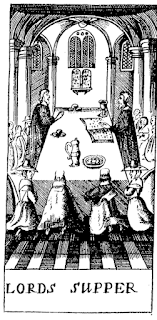'I do not wish it to be thought that they came behind their High-Church brethren in their views of the Eucharist': Laudians and Reformed Conformists together
Groves was responding to and rejecting Tractarian works which, as he demonstrated, misquoted Caroline Divines in order to present them as rejecting a Calvinist understanding of the Sacrament. By contrast, he points to how Laudians and Reformed Conformists (to use our contemporary term) shared a high Reformed eucharistic theology. To put it another way, he is saying that both illustrations accompanying this post shared the same doctrine of the Holy Eucharist.
In this extract, he introduces a central theme of the work. Note how - anticipating Nevin - he regarded "the wretched merely symbolical and intellectual view" of the Sacrament as the result of Arminian influence, particularly that of Hoadly.
I therefore thought that it would be a work useful to the Church, to lay before the public such extracts from the most learned and orthodox of the Anglican Church as might shew what they taught, and what they considered the Church to teach, concerning the Eucharist. In pursuance of this idea, I selected those who wrote and flourished in the reigns of James I. and Charles I., as the Church then was more free than at any other period from suspicion of Puritanism on the one side, and on the other, of that rationalism which English Arminians inclined to towards the close of the century. Of these I have professedly brought forward those who belonged to that party in the Church which was charged, though most unjustly, with a leaning to Romanism, and which may be regarded as holding the highest views respecting the Sacraments. However, when I exclude those who sympathized with Geneva, I do not wish it to be thought that they came behind their High-Church brethren in their views of the Eucharist. On the contrary, for expressive statements of the mysterious nature of this Sacrament, and for profound and most truly spiritual views of the nature of it, and the benefits connected with it, the Calvinistic writers of
this period are surpassed by none. In truth, the wretched merely symbolical and intellectual view which crept into the Church afterwards, and was set forth in its bareness by Hoadley's school in the last century, and which in the present deadens the teaching of modern Calvinism, was an offshoot, not of Calvin's school, but of that of Arminius; and it was the English Arminians, and not the Calvinists, who spread it amongst us. But as my design was to concentrate the teaching of a particular school or party, I was thus obliged to leave out writers like Ussher and Edward Reynolds, whose language is as high as that of any of Laud's school, and higher than that of some of them.




Comments
Post a Comment